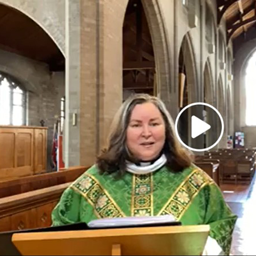Video
View the video of the Eucharist for the 3rd Sunday after Trinity conducted by Mother Katie from inside the Church of St James Malden, including the preached sermon.
If you wish you can also follow the service liturgy by downloading the following pdf:
Text
Sunday School
Collect
God our Saviour, look on this wounded world in pity and power; hold us fast to your promises of peace won for us by your Son, our Saviour Jesus Christ.
Amen.
Readings
Sermon
by Mother Katie
What has lockdown taught you?
That was the question the Archbishop of Canterbury was asked when interviewed on Radio 4 this week.
I wondered about my own replies: it has taught me that teenagers will sleep all the time if you let them; that I have more grey hairs than I thought; that house arrest would be worse than I previously imagined; but also that the Desert Fathers were right – if you go to your cell it will teach you everything. Being made to stay put has enabled me to think more deeply about many things from growing church to healing grief – from economics (household and global) to how we relate and what really matters.
I asked some of you on Facebook – you said – it taught you to have patience and to persevere, that life was previously too fast, that we can still remain busy even at home, that the world and life is fragile, that wise leadership is essential, that we don’t like being out of control, but that we are essentially creative – and can find lots of news ways to do things and change when we have to, that there is much to be said for simplicity, and that ballet and beer are part of the joy of life. Not necessarily together.
The Archbishop of Canterbury said this – his answer was that he had realised how deeply connected and dependent we are on each other – how not one of us can do life alone.
And that really struck me as wisdom – as it is exactly the message of our Gospel today.
We’ve reached the final part of the Matthew’s discourse on mission and discipleship –and we move on from being told about risk to reward – from the necessity of vulnerability to the strong prophetic role we are called to. Like last week’s sparrows and hairs on your head – this passage also teaches us that God sees everything; God notices it all. Even a cup of water to a little one. And so if we honour the prophet we receive the same reward as the prophet – in other words there is no competition in the Kingdom of God – no personal empire building – we are in this together. The kitchen staff at Lambeth Palace is every bit as vital to a good welcome as the Archbishop – the porter at the hospital as important as the surgeon in getting the patient where they need to go – we need each other – without the other we can not fulfil our potential. That doesn’t mean we all do the same thing – we can’t do that – it does mean we all receive the same reward from God – because he is the one who notices sparrows and individual hairs – and so he sees the small things we offer in a totally different perspective to human vision.
The writer H L Gee tells a lovely story about a young boy in a country village who after many struggles and difficulties eventually becomes a religious minister. In the early days of his theological study the local cobbler is his greatest help and encourager – the cobbler shows a keen interest in his progress. And when the day comes for the young minister to preach his first sermon the cobbler presents him with a pair of shoes and said it was always my desire to be a minister myself – and circumstances never allowed that – but I want you to let me make and cobble your shoes, for nothing, from now on – I want you to wear them in the pulpit when you preach – and then I will feel you are preaching the gospel that I always wanted to preach and standing in my shoes.
Without a doubt the cobbler and preacher deserve equal reward. And in some way we all serve standing in each others shoes.
And the Kingdom comes alive when we realise this – because then it not only keeps us humble – but it matters how we welcome each other – how we create space for each other – how we honour one another – and our task becomes far less about what we can each individually give or receive and far more about what we as community can share and provide for each other.
The way of the cobbler is the way of the disciple and follower – being a person who longs to preach the gospel and realising that will sometimes look like cleaning, it will sometimes look like photocopying, it will sometimes look like giving or singing or taking food to the food bank or a prescription to an elderly neighbour. It means actively looking for ways of helping and building each other up instead of the easier temptations of gossip or criticism. It means we look for ways to refresh each other – offering the glass of water – knowing that God sees – God rewards.
And because honestly – we can’t do this faith journey alone – not even Jesus managed that – his cobblers were fishermen and tax collectors, tent makers and prostitutes. The Archbishop of Canterbury is right – we are deeply connected and deeply dependent on each other – we all need the offer of shoes to stand in – we all must offer our shoes to others too. For it is the hospitality of relationship that enables each other and the gospel to grow.
How we treat each other – and in particular how we treat those sent to us by God – really matters.
Which is why it is so important that very soon the doors will be open and public worship will begin again – I’ve loved our online experiences – and we will keep some of our online presence going – but I’ve missed welcoming you here so much. We travel better together.
We are still waiting on government guidance in how this needs to be done – but as soon as we’ve received it I shall be writing to you all to explain how this will be possible in our parish – it may not be church as we previously knew it – it may be that we don’t want to go back to church as we previously knew it – perhaps we have learnt things that will encourage change and challenge us to move forward – there may be some things we want to keep about our lockdown experience – and others we can’t wait to get rid of.
Thinking about this I have asked the PCC to consider 4 questions this week as they relate to church – perhaps you could do the same and send me your answers as we think about reopening. You might want to apply the questions to your own life too as a prayer exercise this week – we shall print them off and have them in church for the private prayer sessions.
The first is this – What have we lost during this time that we wish to regain?
Secondly – what have we lost that should remain lost?
Thirdly – what have we gained for a season that we can let go of?
And finally what have we gained that we wish to retain?
And my prayer as we make these next steps forward is that we have the vision and boldness of a prophet; the vulnerability and humility of a sparrow and the generosity of a cobbler. And that we – like those early disciples – find our purpose, our identity, our freedom and joy in mission and sharing the gospel with a world that has never needed to hear it more. There is much work to be done – and it can’t happen without you.
Amen.

